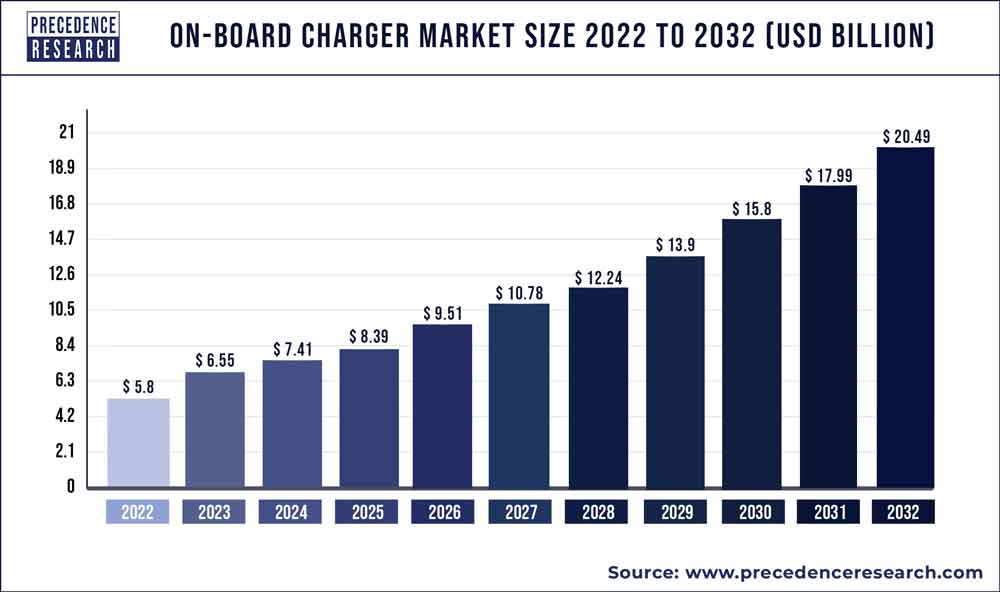The global on-board charger market size surpassed USD 6.55 billion in 2023 and is expected to hit around USD 20.49 billion by 2032, poised to grow at a CAGR of 13.50% from 2023 to 2032. The on-board charger market is growing due to the rising adoption of electric vehicles (EVs), advancements in charging technology, and government incentives promoting EV use. Additionally, increasing environmental awareness and investments in EV infrastructure further fuel market expansion.

On-Board Charger Market Key Takeaways
In terms of power output, the US on-board charger market was worth USD 458 million in 2022.
In terms of power output, the 11 kW to 22 kW sector held around 43% of the market in 2022.
By vehicle type, passenger vehicles accounted for 37% of the market in 2022, while the bus segment is expected to increase at a spectacular CAGR from 2023 to 2032.
By propulsion type, the BEV category will account for 69% of the market in 2022, while the PHEV segment will increase significantly between 2023 and 2032.
Asia Pacific is expected to account for more than 40% of total income in 2022, while Europe is expected to have significant increase from 2023-2032.
In 2022, European plug-in passenger car sales reached 8%, up from 4% in 2021
Get a Sample: https://www.precedenceresearch.com/sample/1870
On-Board Charger Market Regional Analysis
North America:
North America commands a significant portion of the global on-board charger market. This stronghold is primarily attributed to the region’s widespread adoption of electric vehicles (EVs) and the supportive stance of government policies towards sustainable transportation. Additionally, the presence of major automotive manufacturers and continuous technological advancements further fortify the growth prospects of the market in this region.
Europe:
Europe stands as another pivotal market for on-board chargers. This prominence is propelled by stringent emissions regulations and the establishment of a robust EV infrastructure across the continent. Countries such as Germany, Norway, and the Netherlands emerge as frontrunners in the adoption of electric vehicles, consequently driving the demand for efficient on-board chargers.
Asia-Pacific:
The Asia-Pacific region anticipates the most rapid growth rate within the on-board charger market landscape. This surge is fueled by rapid industrialization, urbanization trends, and concerted government initiatives aimed at promoting electric mobility. Nations like China, Japan, and South Korea spearhead this transformation, with substantial investments in EV infrastructure and cutting-edge technology. Notably, China emerges as a dominant player in the global EV market, further augmenting the demand for on-board chargers through significant investments and advancements in EV technology and infrastructure.
On-Board Charger Market Trends
Shift Towards Higher Power Chargers:
The on-board charger market is witnessing a noticeable shift towards higher power chargers, driven by the escalating demand for fast charging solutions. While traditional on-board chargers typically operate at 3.3 kW or 6.6 kW, the latest models are capable of delivering power levels up to 22 kW or even higher. This trend is spurred by the imperative to reduce charging times and enhance the overall convenience of electric vehicles (EVs), aligning with consumers’ expectations for quicker and more efficient charging experiences.
Integration of Smart Charging Features:
The integration of smart charging features in on-board chargers is increasingly prevalent, reflecting a response to the evolving needs of EV owners and the broader energy landscape. Smart on-board chargers offer a spectrum of functionalities, including load balancing, demand response, and energy management. These features empower better interaction with the grid, optimize charging schedules based on grid conditions and user preferences, and ultimately, contribute to reducing overall energy costs for EV owners. The integration of smart charging features not only enhances the efficiency of EV charging but also aligns with the broader goals of grid optimization and energy sustainability.
Wireless Charging Technology:
Wireless charging technology is gaining momentum within the on-board charger market, heralding a new era of convenience and seamless charging experiences for EV owners. This innovative technology eliminates the need for physical connectors, offering a hassle-free and user-friendly charging solution. Although still in its early stages of commercialization, wireless on-board chargers hold substantial potential for future growth. Advancements in resonant inductive coupling and magnetic resonance technologies are driving the refinement and adoption of wireless charging solutions, paving the way for a future where EVs can be effortlessly charged without the constraints of traditional wired connections.
On-Board Charger Market Dynamics
Drivers:
- Increasing Adoption of Electric Vehicles (EVs) Globally: More people are switching to electric vehicles, which naturally increases the demand for on-board chargers.
- Government Incentives for EV Adoption: Various government initiatives like tax credits and subsidies encourage EV adoption, thus driving the need for on-board chargers.
- Advancements in Charging Technology: Continuous improvements in charging tech result in more efficient and faster chargers, making electric vehicles more appealing.
- Growing Environmental Concerns: With a focus on sustainability and reducing carbon emissions, there’s a significant push for cleaner transportation, boosting the demand for on-board chargers.
Restraints:
- High Initial Costs of Charging Infrastructure: Installing charging infrastructure can be expensive, which may deter potential buyers from investing in electric vehicles.
- Range Anxiety Among Consumers: Concerns about the limited driving range of electric vehicles and the availability of charging stations can discourage some consumers from switching.
- Infrastructure Limitations: In some areas, the lack of sufficient charging infrastructure poses a challenge to widespread EV adoption.
- Standardization and Compatibility Challenges: The absence of standardized charging technologies and compatibility issues can create confusion and hinder market growth.
Opportunities:
- Development of Wireless Charging Technologies: Advancing wireless charging solutions offers convenience and efficiency in charging electric vehicles.
- Expansion of Charging Networks: Increasing the availability and accessibility of charging stations, especially in urban areas and along highways, can promote EV adoption.
- Integration of Smart Charging Solutions: Implementing intelligent charging systems that optimize energy use and pricing can improve the efficiency and attractiveness of electric vehicles.
- Partnerships Between Automakers and Charging Infrastructure Providers: Collaboration between automotive companies and charging infrastructure providers can facilitate the deployment of charging stations and enhance the EV ownership experience.
- Innovation in Battery Technology: Continued advancements in battery tech, such as higher energy density and faster charging capabilities, can address current limitations and drive further EV adoption.
On-Board Charger Market Segmentation
By Charger Type
- AC On-Board Chargers: These chargers convert AC power from the grid to DC power for battery charging and are commonly found in most electric vehicles.
- DC On-Board Chargers: DC chargers bypass the vehicle’s internal AC charger, allowing for direct DC fast charging, significantly reducing charging times and enhancing convenience, particularly for long-distance travel.
By Vehicle Type
- Battery Electric Vehicles (BEVs): BEVs rely solely on electric power for propulsion and require efficient on-board chargers to recharge their battery packs.
- Plug-In Hybrid Electric Vehicles (PHEVs): PHEVs feature both electric and internal combustion engines, necessitating versatile on-board chargers capable of accommodating hybrid powertrains.
On-Board Charger Market Leading Companies
- Tonhe Technology
- Anghua
- Wanma
- Kongsberg
- Lear
- Delphi
- Infineon
Segments covered in the report
By Vehicle Type
- Boats
- Vans
- Passenger Cars
- Buses
- Medium and Heavy Duty Vehicles
- Others
By Power Type
- 11 kW to 22 kW
- Less than 11 kW
- More than 22 kW
By Propulsion Type
- Plug-in Hybrid Electric Vehicle
- Battery Electric Vehicle
By Sales Channel
- Original Equipment Manufacturer (OEM)
- Aftermarket
By Geography
- North America
- Europe
- Asia-Pacific
- China
- India
- Japan
- South Korea
- Malaysia
- Philippines
- Latin America
- Brazil
- Rest of Latin America
- Middle East & Africa (MEA)
- GCC
- North Africa
- South Africa
- Rest of the Middle East & Africa

